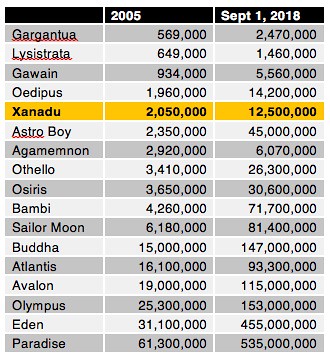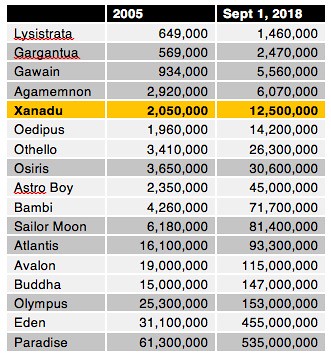Back in January of 2005 I investigated the occurrence of Xanadu on the web, producing a series of Google queries that allowed me to get a sense of the contexts in which the term appeared. About a year later I made use of that work in an online symposium devoted to Franco Moretti’s Graphs, Maps, Trees. I reported those results in a post entitled, One Candle, a Thousand Points of Light: Moretti and the Individual Text. In 2010 I reworked those results into a working paper, One Candle, a Thousand Points of Light: The Xanadu Meme (at Academia.edu, at SSRN).
I’ve now updated one small bit of that work. In order to get some sense of what my Xanadu numbers mean I googled a number of other terms and sorted them in order of hits from lowest to highest. Here’s a table showing those results for both January 2005 and now for September 2018; the table is sorted according to the 2005 results from lowest to highest:
Perhaps the most obvious difference is that the 2018 numbers are much larger than the 2005 numbers, which isn’t at all surprising. Agamemnon shows only a 208% increase over 2005, the smallest; Astro Boy shows a 1915% increase, the largest; and Xanadu shows a more modest 610% increase. The average increase was 849%.
But sheer magnitude isn’t the only difference. The relative ordering shifted a bit as well. This table shows the results sorted by the 2018 results:
Notice that Xanadu is fifth smallest (out of 17) in both lists while Paradise is the largest. However, whereas the count for Astro Boy was only a bit larger than that for Xanadu in 2005 (2,350,000 vs. 2,050,000 or 115%), it was considerably larger in 2018 (45,000,000 vs. 12,500,000, or 360%). That would seem to indicate that the cultural importance of Astro Boy increased more in the intervening decade than that of Xanadu.
There was also some change in relative order. Thus Agamemnon had more hits than Xanadu in 2005 (2,920,000 vs. 2,050,000) and fewer in 2018 (6,070,000 vs. 12,500,000). Conversely, Oedipus had fewer hits than Xanadu in 2005 (1,960,000 vs. 2,050,000) but more in 2018 (14,200,000 vs. 12,500,000). There are other changes in ordering as well, but those are the only ones with respect to Xanadu.
It’s not at all obvious to me that there is any neat way to summarize these various changes. I feel safe in attributing the overall increase in numbers to the overall growth of the web. I’m not sure what to say about the position of Xanadu relative to the others. I had no systematic principle of selection in choosing terms. Though I don’t recall just what I did, I feel pretty certain that I didn’t formulate a list and then run the queries. Rather, I ran queries until I had a nice range of results, both smaller and larger than Xanadu.
On the other hand, I certainly didn’t pull those terms out of a hat. Xanadu is the second word in “Kubla Khan”, one of the most important poems in the English language; Paradise is the last word in the poem while Eden is a Christian paradise. Lysistrata, Gargantua, Gawain, Agamemnon, Othello, Atlantis, Avalon, and Olympus all reference important literary/cultural works in the Western tradition. So does Oedipus, but it also has a significant use outside of literature, in psychoanalytic discourse. Buddha, of course, is non-Western; Bambi belongs to popular culture; and Astro Boy and Sailor Moon are Japanese titles that have become fairly well known in the English-speaking world.
That Xanadu’s relative position hasn’t changed most likely indicates that little happened to change its relative visibility. There was a Xanadu musical on Broadway that opened in 2007 and ran for 500+ performances. It has also had touring versions.
On the other hand, I certainly didn’t pull those terms out of a hat. Xanadu is the second word in “Kubla Khan”, one of the most important poems in the English language; Paradise is the last word in the poem while Eden is a Christian paradise. Lysistrata, Gargantua, Gawain, Agamemnon, Othello, Atlantis, Avalon, and Olympus all reference important literary/cultural works in the Western tradition. So does Oedipus, but it also has a significant use outside of literature, in psychoanalytic discourse. Buddha, of course, is non-Western; Bambi belongs to popular culture; and Astro Boy and Sailor Moon are Japanese titles that have become fairly well known in the English-speaking world.
That Xanadu’s relative position hasn’t changed most likely indicates that little happened to change its relative visibility. There was a Xanadu musical on Broadway that opened in 2007 and ran for 500+ performances. It has also had touring versions.
I’m willing to attribute the dramatic increase for Astro Boy and Sailor Moon (1915% and 1317% respectively) to spreading interest in Japanese popular culture–both are popular manga and anime titles. But I have no suggestions for Bambi (up 1683%) and Eden (1463%). Agamemnon and Lysistrata had the lowest increases (208% and 225%). Why? A decline in classics majors? Who knows?
And so it goes.


No comments:
Post a Comment